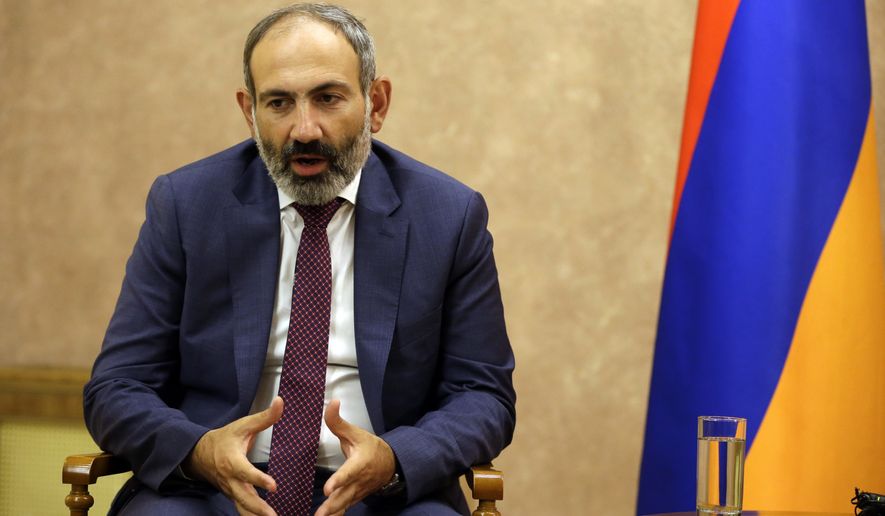OPINION:
Normally politics is the art of the possible. However, during a revolution like the current one in Armenia, the space of the possible expands dramatically.
Thus, on May 8 Nikol Pashinian, the leader of the revolution became prime minister of Armenia, thwarting the plans of the old guard who hoped to retain power under a new constitution they engineered only to have their naked power grab blow up in their face. Yet, even during revolutionary times political space is not unlimited and must be creatively exploited for the new leadership to succeed.
In Armenia’s case the main obstacle is not the internal obstruction of the corrupt old guard, but of the force that stands behind it — Russia. Indeed, Karen Karapetyan, who succeeded Serzh Sargsyan, the engineer of the constitutional changes and ensuing power grab, is a former executive of Gazprom, i.e. Moscow’s man.
It was clear to everyone that if Armenia sought to emulate Ukraine in 2014, eject the entire old regime and repudiate Armenia’s membership in Russia’s organizations for military-economic control — the Collective Security Treaty Organization (CSTO) and Eurasian Economic Union (EEU) — that Moscow would come down hard on the new regime. Indeed, Vladimir Putin stated as much.
Thus, Mr. Pashinian and his colleagues displayed their understanding of what was possible to come to power. But as long as Armenia is shackled by its membership in those Russian organizations it cannot realize the dreams of its people for a better, more prosperous, and more secure life.
Those organizations benefit Moscow and are a pretext for Moscow to keep troops in Armenia and manipulate the war in Nagorno-Karabakh (an internationally recognized region of Azerbaijan, occupied by Armenia for 25 years) that has hijacked a generation of Armenian politics and brought crooks and killers like Mr. Sargsyan to power while cementing an alliance between Armenia’s oligarchs and politicians not unlike Mr. Putin’s domestic system. Obviously, as long as Armenia has no alternative other than Russia, Moscow’s yoke will lie heavily on it and gradually suffocate the current revolution.
It is therefore necessary for the West to adopt a much more proactive position and offer tangible support to the new regime that clearly wants to diversify Armenia’s foreign and economic policies. Such material economic and political help will undoubtedly be welcome, help it survive and expand what is possible in Armenia. But this policy must be undertaken for the long term and must also undo the generation of indifference to the Caucasus that has characterized far too much of European and American policy since 2000.
As long as the war in Nagorno-Karabakh remains unsettled it will dominate Armenian politics and drive Yerevan to seek Russian support that invariably comes at the price of any lasting economic and political progress, as Armenia, on its war footing, is left out of the mammoth infrastructure projects of the region that has so lent to prosperity.
Indeed, Russian domination consigns Armenia to perpetual stagnation and thus to perpetual instability — the revolution is the fifth manifestation of unrest since 2011. But to the extent that Western involvement helps Baku and Yerevan negotiate peace and sustain Armenian democracy take place then Armenia can gradually and peacefully move back to Europe, which is the only hope for its people.
Despite the expansion of the possible, we have seen in Armenia since April 15 the absence of Western involvement will leave the field to Russia so that it can corrode the revolutionary and democratic impulse while also exploiting the nationalist impulses that invariably underlie successful revolutions. That would mean the war goes on, the revolution peters out, and another chance for progress in this sorely beset nation has been thrown away by Western apathy and indifference.
Neither would peace in Nagorno-Karabakh threaten Russia since it clearly does not want a war now but rather managed tension between Armenia and Azerbaijan. However, if Russia wants to maintain suzerainty over Armenia it must pay even more for it, i.e. subsidizing its empire just as in Soviet times. Yet, ironically, only a few oligarchs in both countries benefit from these “subsidies” while the burden on both states grows steadily.
And, if the past is any guide to the present, new forms of instability will grow in Armenia and ultimately engender another upheaval. Stabilizing the Caucasus through Western support for peace there really is a win-win program of action, but it is also the only way forward to support Armenia’s democratic forces.
In other words, Armenia can and already has expanded the limits of the possible in its domestic politics. But without lasting external support that fragile accomplishment is likely to wither on the vine under Russian pressure. But if Western leaders expand their vision of what is possible and desirable in regard to the Caucasus they may be able to achieve the “trifecta” of sustaining a more democratic Armenia, bringing peace to Armenia and Azerbaijan, and thus reducing the high degree of tension and rumors of war that now pervades the Caucasus.
• Stephen Blank, a senior fellow at the American Foreign Policy Council, is a former MacArthur fellow at the U.S. Army War College.




Please read our comment policy before commenting.